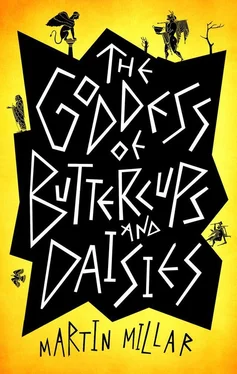Luxos, bursting out of the shrine, ran right into Metris. He immediately embraced her, taking her slender body in his arms and hugging her tightly. Luxos, while slightly built and undernourished, was not quite as weak as he appeared. Much as he’d disliked it at the time, he had undergone military training with the rest of the Athenian youths. The effects of that had not yet worn off.
‘I was just praying I’d meet you again! Athena really worked quickly on this one! She’s such a great goddess!’
The nymph smiled. It was a warm night. A slight breeze made her short white dress flutter. There were silver threads in it that seemed to glow faintly, even in the moonlight.
‘I’ve been thinking about you, too. There must be some way of making Athens listen to your poetry. Isn’t the city full of wise people? Who’s the wisest?’
‘Socrates, I suppose.’
Metris took Luxos’s hand. ‘Then let’s go and talk to him.’
They walked off together, heading north into the dark streets of night-time Athens, where there were few lamps lit, oil being so expensive these days, and in short supply. A little later Bremusa emerged from the shrine. Finding no one there, she cursed in a language that was no longer spoken in the world.
‘Has that idiot Metris wandered off again? Does she have no concept of actually doing what she’s supposed to?’
Aristophanes knew he’d been neglecting himself. He often did when he was putting on a play. He regretted it. It was the duty of every Athenian of fighting age to keep himself in reasonable shape. In those days the call to arms was never far away, and an unfit citizen was no use on the battlefield. Even if the march outside the city walls didn’t end in battle, as was sometimes the case, it was a miserable experience to be trudging along behind your fellow hoplites if you were badly out of condition. The spear, shield and armour of the Athenian warrior could be a weighty burden.
He’d have liked to visit the gymnasium. It would strengthen him and might even clear his mind. Unfortunately he just didn’t have the time. There were too many things wrong with his comedy. Shabby props and costumes weren’t his only problems. The chorus were singing poorly and urgently needed a better vocal coach. The musicians weren’t playing well, the choreography was lacking and the funny dances were less than amusing. As for the precise positioning of the actors on stage during each scene, they’d hardly got started. In the great Theatre of Dionysus Eleuthereus, the audience sat in a huge semicircle around the stage. It was vital that the actors worked together, moving correctly into position and standing in the right place at all times. Otherwise the drama would suffer and the jokes wouldn’t work. They’d now fallen so far behind with this that Aristophanes had been forced to call extra rehearsals, which hadn’t gone down that well with the cast.
‘It’s lucky I’ve written such a good script,’ he mused, as he walked through the pale light of dawn towards the rehearsal space. Or I’d lose all hope.
Aristophanes was seriously worried that they might not even make it to performance. Cancelling the play would be humiliating in the extreme, and could make it difficult for him to find a producer next year. Even so, it might be preferable to taking the shambles they had at the moment on stage. If he did, the Athenians would certainly laugh, but not in a good way.
Aristophanes kicked several stones as he walked. Recently he’d been feeling vaguely angry about everything, and particularly angry about his rivals Eupolis and Leucon. There was no denying it, he loathed them. He really couldn’t stand the thought of either of them winning first prize. He idly brushed his hand over the Herm at the corner of the street — Aristophanes had always liked these little statues on the corners of Athens, with their cheery faces and confident upright penises — and almost bumped into Socrates, coming briskly in the opposite direction. The morning air was chilly but the philosopher was dressed, as always, in a plain chiton, and hadn’t bothered to cover it with a cloak. Socrates never wore a cloak. He seemed immune to bad weather.
They greeted each other politely.
‘Good morning, Socrates. Off to the gymnasium for some exercise before a hard day’s philosophy?’
‘I am. And you?’
‘I’ve no time to exercise. I’m busy with rehearsals.’
‘Ah… Any jokes about me in your play this year?
‘Why do you say that?’
Socrates laughed. ‘Because you always make jokes about me.’
‘And I always admire how well you take them!’
It was true. Socrates did take it well, unlike the Athenian politicians. They might make a show of approving the way comic playwrights ridiculed them, because it demonstrated what a fine, free democracy the city was. In reality, they seethed in private, and sometimes sought revenge.
‘Socrates, are you going to Callias’s symposium tonight?’
‘I wasn’t planning to. Isn’t it meant to be for playwrights and actors?’
‘Mainly. But if I have to listen to Eupolis and Leucon droning on about how well their rehearsals are going I might do something I’ll regret. There will be others there too, you could come along. Callias likes to pretend he understands philosophy, Zeus knows why.’
‘How would my presence help?’
‘Just say something clever if you see me reaching for my weapon.’ Aristophanes chuckled. ‘“Reaching for my weapon”. Rather a good line. Must remember it. Audiences always love a good double entendre.’
Socrates laughed too. In the past, he’d appreciated Aristophanes’ clever wordplay. ‘Like when your actor playing Euripides was hunting for an argument in his bag, saying he was going to pull out something “strong and meaty”?’
‘That was a good one! The audience roared.’
‘They did. Though the real Euripides looked rather grim, as I remember.’
‘Well, he has a poor sense of humour. Just look at his plays.’
Aristophanes walked on. The streets were still quiet. The morning bustle would start soon, though the morning bustle in Athens was not what it had been. There used to be a scramble for the best places in the agora. Merchants and their servants could be seen at all hours, vying for the best spot. That didn’t happen now. There weren’t enough goods to sell.
Round the next corner Aristophanes ran into Hyperbolus. He tried to ignore him but Hyperbolus stood in his way. He was a large man, strong, and heavily bearded.
‘Hyperbolus? What are you doing here? Shouldn’t you be practising your shouting?’
Hyperbolus glared at him. ‘Aristophanes, you make me sick. You and your rich friends. You can’t stand it that an ordinary man like me has some influence in this city. You’d like to go back to the time when rich people ran everything.’
‘I’d like to go back to a time when Athens wasn’t run by self-serving buffoons.’
Even when he wasn’t addressing the assembly, Hyperbolus had a very loud voice. It boomed out over the quiet streets. ‘If you keep insulting the city that way, you’re going to be in trouble.’
‘For such a determined democrat, Hyperbolus, you’re not very keen on considering other people’s views.’
‘Not if their views are traitorous.’
‘Hoping for an end to the war isn’t traitorous.’
‘It is if it means giving in to these filthy Spartans.’
By now they were almost nose to nose. Hyperbolus was a far larger man but Aristophanes didn’t intend to back down.
‘I’ve fought for Athens more times than you have, Hyperbolus. But it’s time to end this war. You and General Lamachus like conflict. It’s good for your careers. Everyone else is sick of it.’
Читать дальше












